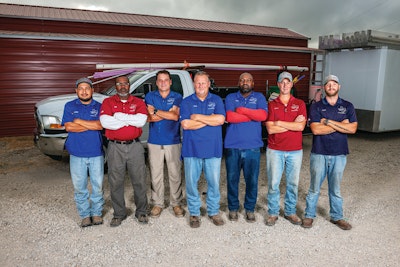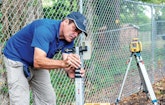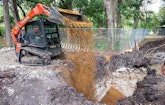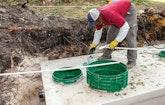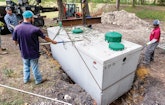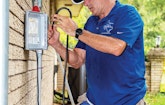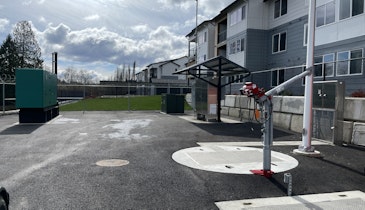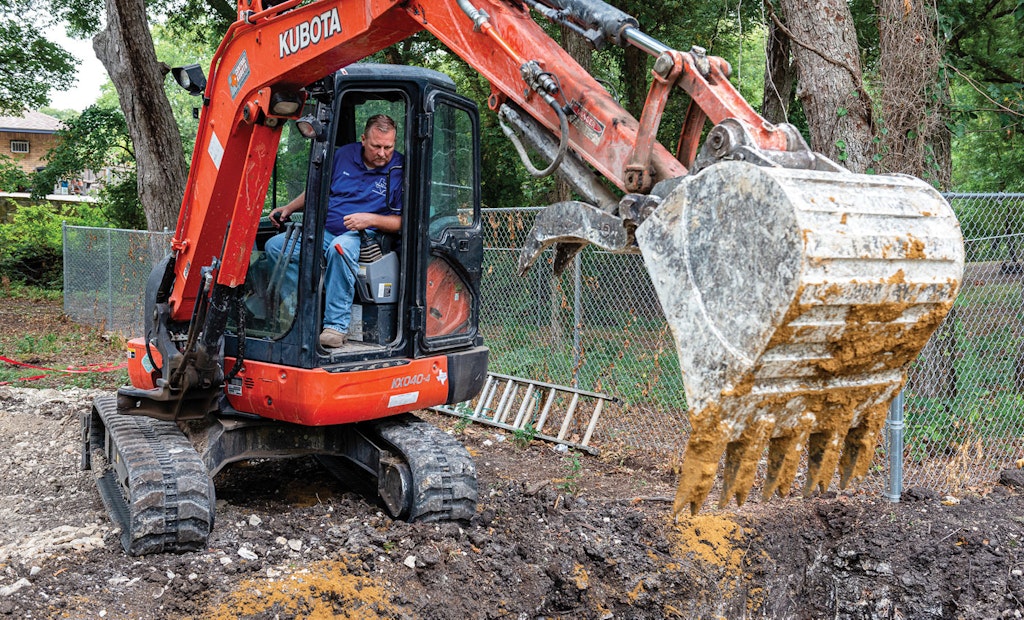
Brian Wakefield prepares to level a sand layer at the bottom of an excavation during an install project. (Photos by Olivia Ogren-Hrejsa)
Waxahachie, Texas, on the edge of the Dallas-Fort Worth metroplex, is in a geologic area of clay soils, fractured rock and limestone. As a result, conventional septic systems have not been an ideal product, and today aerobic treatment units are being installed in almost all new construction and many old conventional units are being replaced.
The requirement for regular maintenance of ATUs turned out to be a game changer for Brian Wakefield and his father, Jerry Wakefield, who started a real estate inspection business in the late 1990s. Initially they knew next to nothing about septic systems but eventually realized it would be helpful to learn something about them. They took classes, got a Class D license and started inspecting ATUs as a sideline to fill in between real estate work. To their surprise, that service turned out to be very successful for them.
“Next thing you know, it took over and we were actually becoming a large company just doing maintenance contracts,” Brian Wakefield says. In the early 2000s, they discontinued their real estate work.
Having stepped into the wastewater industry, they soon added installations, pumping and repairs; and today B&J Wakefield Services is a full-service septic company. Jerry retired a few years ago, but Brian, 48, operates the business out of an 80-by-40-foot shop and a 16-by-30-foot crew office on his 20-acre property. His wife, Holly, manages office work with assistance from part-timer Holly Coulter. The crew is cross-trained to some extent, but installations are done primarily by Willard Cavitt, Ric Seley and Larry Watson; Hermillo Aguilar handles repairs; Aaron Williams does pumping; Chuck Vineyard manages ATU inspections; and Kurt Harrison fills in where needed.
“I switch guys around so they don’t get too bored doing the same thing,” Wakefield says, “and so they don’t get too comfortable in the same spot and riding with the same person all the time.” Their service territory covers a 30- to 40-mile radius, the sweet-spot distance that Wakefield says allows them to deliver quality service while providing enough work to keep busy.
ADDING INSTALLATIONS
After establishing a reputation as ATU inspectors, Wakefield says people started asking them to install systems. So around 2005, he obtained a license, purchased a used New Holland backhoe and began putting in systems, mostly residential. Today installing accounts for about half their business. Their go-to unit these days is Enviro-Flo’s NuWater ATU system. “It’s a 600-gpd unit,” Wakefield says. “It’s been working really well for us, and it’s been enjoyable working with Enviro-Flo.” Maybe once every year or two, B&J Wakefield Services will install a conventional system.
The company’s original backhoe is long gone. They now use a Kubota KX040 mini-excavator with an auger attachment and a Kubota SVL75 skid-steer with a trencher attachment and vibratory plow.
“We use that to plow drip irrigation lines and spray lines,” Wakefield explains. “We don’t usually trench anymore, we vibratory-plow most of our lines in because we can basically be almost trenchless.”
When larger excavators are needed, the company subcontracts the work out. An enclosed 20-foot trailer carries parts and supplies. “We converted it with a pipe rack up top and put all our bins and tool racks inside to carry to a job site,” Wakefield says. “It’s all there, loaded and ready to go.”
In the spring of 2019, they began work on a 70-lot subdivision, which helped carry them through a particularly wet winter and spring.
“We were still able to go into that new subdivision with a 50,000-pound excavator and dig because it was solid rock,” Wakefield says. “It would dry out fast enough that we were able to drop tanks in between the rains and even dig while it was wet. Whereas, for some of the replacements on other properties, it was too wet to get on the properties. The good thing about rock is it doesn’t get saturated.”
Although working in muddy conditions was not exactly pleasant, Wakefield says they had no choice. “I told my guys that if we didn’t, we’d never see the light at the end of the tunnel. It would have been a disaster.” Nevertheless, the weather took its toll, and by fall they were still playing catch-up on a small backlog.
Wakefield knows many of the builders in the area, and working on large subdivisions is not new for the company. The guys are accustomed to working with and around other contractors and just take the inevitable delays and schedule changes in stride. “I’ve been doing it a long time and don’t think anything about it,” Wakefield says. “I’ve got enough business where I can switch jobs if I have to and then go back and do the job.”
DOING IT ALL
The company has maintenance contracts on 1,300 ATUs. They offer seven levels of service. The least expensive plan provides a three-times-a-year basic inspection with a report sent to the regulating authority. Other plans include extra services such as cleaning water pumps and compressor filters, discounted service calls or free products such as chlorine.
At the higher end, the company offers a warranty plan to cover the cost of certain parts such as compressors or water pumps. Its premium warranty plan also includes free sludge removal. Customers can pay yearly or monthly using any form of payment including autopay through their bank or online bill pay through the company website.
In 2014 the company added septic pumping, which now accounts for about 15% of its work. “We were getting five to 10 calls a day requesting pumping,” Wakefield says. “And we were tired of companies who came in and would either try to refer somebody else or flat-out not do the job right and we’d have to go out and fix stuff.” The vacuum truck is a 2013 Freightliner M2 with a 2,500-gallon steel tank and Jurop/Chandler LC420 pump. Equipment includes a camera, locator and Milwaukee Tool battery-powered drain cleaning machine. Septage is taken to the Dallas wastewater treatment plant.
Wakefield sends all his drivers to school to learn septic system maintenance so they can offer full service anytime they’re at a site — “So, if we need to pull a water pump while we’re there or fix something, we can do it at the time of service.” Wakefield says more companies today are one-stop shops, but when he started, he was one of the few in the area. “Customers like it because they know we’re going to take care of it for them. We do it all.”
KEEPING TRACK
Service routes are planned with Route4Me software. Technicians pull up information on their laptops.
“I upload their inspections and it’ll give the driver a list for the day,” Wakefield says. “He clicks on when he’s been there and when he’s left. It will actually track a breadcrumb trail and leave a time stamp.” Wakefield says it also protects them in situations when a homeowner claims the technician didn’t show up.
“When you have that many customers, sad to say, you get people who want stuff for free and they’ll say the guy didn’t do his job. We use that technology to prove my guy was there. The customer backs off when they see how much detail you have.”
Vehicles are outfitted with TomTom Telematics GPS units for navigation and tracking. Wakefield says tracking has many benefits. “We know where the driver has been, how fast they’re going, how long they’ve taken for lunch and where they went. If somebody wants to know how much longer before the driver will get there, I can pull that up.”
ATU inspections are done using SAFE Software, which contains the customer database. The technician transmits the data back to the office at the end of the day. Bookkeeping and account management are handled with QuickBooks.
Wakefield maintains the company’s website himself. “I’m not a website expert by any means,” he says, “but I just played with it long enough and figured it out.” He also helped build a website for the Texas Onsite Wastewater Association, an organization he has been a member of for 16 years and for which he has served as president and currently sits on the board.
MANAGING GROWTH
Wakefield says he doesn’t do much marketing other than the website.
“I used to market a lot. But the problem is you spend a lot of money and, yes, I grew but at a rate that was hard to control. So, we quit advertising, quit spending all that money, and now I grow at a good, steady rate. We stay at a level I can control, and it’s all by word-of-mouth.” Another factor he has to take into consideration is the difficulty of finding employees because of the extremely low unemployment rate.
The septic business has given Wakefield the opportunity to exert control over many facets of his work life. “I like being able to manage the chaos and control the outcome,” he says. “And I like the freedom of doing whatever I want to do. I take pride in the quality, craftsmanship and service we offer, and I’m able to make sure that happens as the owner of the company.”
Trash to treasure
As owner of B&J Wakefield Services, Brian Wakefield relies heavily on his employees and says he works hard at treating them fairly and paying a decent wage.
“Everybody says I’m a good boss,” he says. “And then some people say I’m too lenient. I’m stern when I need to be stern, I talk to them when I need to talk to them, and I’ve fired the ones I needed to fire. If they do a good job and treat me fairly, I will reward them correctly as well. And I will praise them when praise is due.”
Offering insurance benefits is hard to do, he says, and not feasible, but some team members have other sources to draw on and others have found discounted rates with Wakefield’s help. “In a lot of cases, it’s cheaper for them to go out and get it themselves,” he says.
His one big annual splurge for the staff is taking everyone out to a restaurant for a Christmas lunch. And he has one handy resource that helps him fund the Christmas bonuses — scrap metal.
“When we replace water pumps or air compressors with these aerobic units or wiring that goes bad, all that is scrap metal,” he says. “We probably have thousands and thousands of pounds of it per year. Instead of throwing that away, we keep it in bins, and then two or three times a year, we’ll run everything up to the scrap yard and get money for it. I keep it in the safe, and that’s what I use for Christmas bonuses. Instead of me pocketing it, I give it back to them.”
